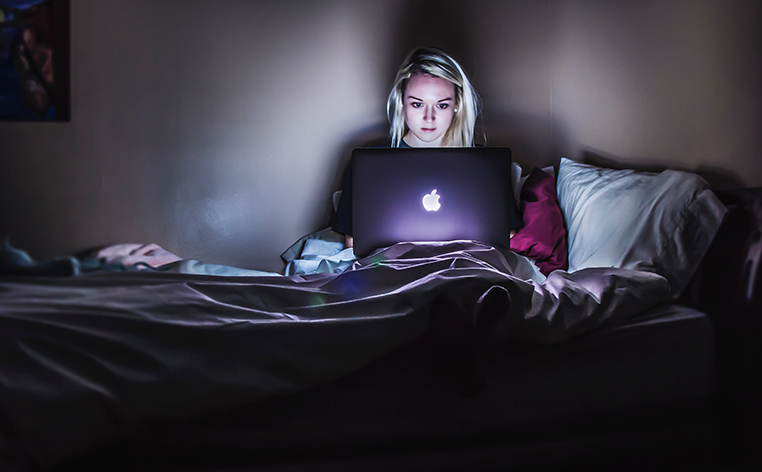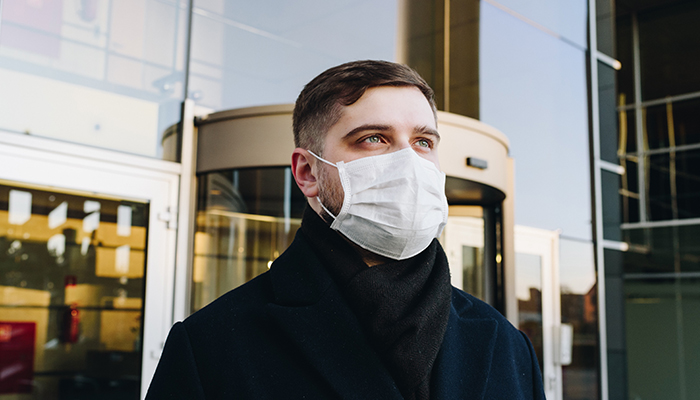Tips for looking after your mental health and wellbeing while studying from home
In response to the COVID-19 pandemic there has been a lot of change, disruption and uncertainty for people all over the world. It’s important that in these trying times we look after ourselves and each other. In addition to the general widespread stressors of the crisis, it’s important to acknowledge the additional stressors that students will face with moving to the much safer mode of delivery online.
Studying from home can present some challenges for students in terms of their mental health and wellbeing, however with a little bit of planning, organisation, care and creativity it can be a very effective (and comfortable) place to be and can present some opportunities that could lead to some significant personal and academic growth.
Factors that may influence and affect your mental health include
- Ongoing changes to daily circumstances and routines such as university classes and lectures.
- Lots of uncertainty.
- Less access to places and activities that you would normally visit such as shops, cafes, gyms, swimming pools, classes etc.
- While it is important to stay informed, ongoing exposure to large amounts of media coverage related to the coronavirus can be very stressful and confronting for some people, causing an increase in anxiety or other mental health issues.
- Social distancing policies, quarantine measures, self-isolation directives and other restrictions to everyday life can be particularly stressful and isolating.
- Loss of employment and/or financial stress for you and or your loved ones.
- Concerns for your health or the health of those you are close with.
- Separation from family and friends through isolation or who may be in different states, territories or countries.
- Those who have an existing mental health issue or who experienced a mental health issues in the past such as anxiety, depression or another mental health condition are particularly vulnerable to the impacts of public health measures in place to contain the virus such as isolation.
- Increase in drug and alcohol use.
- Exam and study stress.
Common thoughts, feelings, responses and reactions you may experience
- Feeling stressed and overwhelmed.
- Fear, anxiety, worry or panic.
- Racing or persistent thoughts you find difficult to manage.
- Physical symptoms, such as increased heart rate, sweaty palms, stomach upset, fatigue, muscle tension and pain, headaches or other uncomfortable sensations.
- Low mood, sadness, tearfulness.
- Loss of motivation and energy.
- Difficulty concentrating, paying attention and/or relaxing.
- Frustration, agitation, restlessness.
- Difficulty managing your anger.
- Anxiety and concern for your health and safety.
- Apprehension or fear of being in public spaces.
- Difficulty sleeping or sleeping too much.
- Changes to your appetite.
- Feeling lonely and disconnected from others.
- Loss of interest in activities you would normally enjoy.
- Feeling helpless or powerless.
When to seek more urgent help and support
If you are experiencing persistent low mood, anxiety, panic attacks and/or poor sleep, consider seeking support from your doctor or book into speak with one of the mental health staff at Griffith Counselling and Wellbeing. You can book an appointment online here.
Urgent support
If you need urgent help or support you can contact the 24/7 Griffith Mental Wellbeing Support Line on 1300 785 442 or text 0488 884 146.
If you are experiencing thoughts of suicide, please contact 1300 MH CALL (1300 64 2255) immediately. If you require emergency assistance please call 000.
Other contacts if you or someone you know needs help:
- Lifeline on 13 11 14
- Kids Helpline on 1800 551 800
- MensLine Australia on 1300 789 978
- Suicide Call Back Service on 1300 659 467
- Beyond Blue on 1300 224 636
- Headspace on 1800 650 890
- ReachOut
- Care Leavers Australasia Network (CLAN) on 1800 008 774
Strategies and tools to look after your mental health and wellbeing
Accepting change
Whilst it is very understandable and normal to be concerned about the coronavirus, try to remember that there are many experts from a range of fields such as medicine, science, government and public health all around the world working to contain the virus and develop a vaccine. During this time of adjustment, change and uncertainty try the most effect ways to manage stress and anxiety is to focus on what is in your control.
Dr Russ, Harris author of the Happiness Trap has released a free ebook on using the principles of Acceptance and Commitment Therapy (ACT) to respond effectively to the crisis, which you can access here.
Self-isolation and quarantine
Being contained at home when in self-isolation or quarantine can be particularly difficult. Try to keep reminding yourself that this is a temporary situation and your efforts are protecting the community from the spread of the virus. Try to remember that this is a temporary measure to slow the spread of the virus and things will go back to normal with time.
The government has announced that medical and mental health staff in the community will be allowed to bulk-bill sessions conducted via video conferencing services, including FaceTime, Skype and WhatsApp for people in quarantine as well as other vulnerable populations. For more information visit this site.
Resources
The following info sheets have been developed by the Griffith University Counselling and Wellbeing and Health and Medical Services teams to provide you with additional support.
Looking after yourself
Stay connected and engaged
Compared to the social buzz of being on campus, studying from home can feel lonely at times which can have an affect on your mental health and wellbeing. It’s important to make sure you allow time to connect with others throughout the day.

- In keeping with social distancing guidelines, wherever possible aim for at least one face-to-face conversation each day. This could be with a house mate, the shop attendant, post man or a neighbour over the fence etc.
- Spend time interacting with your pets if you have any, this can help to boost the happy hormone oxytocin.
- Try organising online study groups or catch-ups with other students.
- Organise social gatherings online.
- Stay active on online uni forums and discussion boards.
- Make a list of all the people you can contact and make some protected time in your timetable to call, Skype, or email a few people each day.
- Access support and connection over the phone or online by contacting the staff at Griffith Counselling and Wellbeing.
Fun and self-care
Spending a lot of time indoors can be daunting but it can also be a great opportunity to have some down time, get organised and try something new.

- Make sure you schedule in time to do things that you enjoy.
- Take time to engage the five senses (sight, touch, smell, taste and sound).
- It might be a good time to start that book you’ve been wanting to read or start listening to audiobooks or podcasts.
- Try journaling and self-reflection particularly around your thoughts, feeling, concerns and emotions.
- Learn meditation.
- Take long baths.
- Get creative with some art or craft.
- Attend to the garden, start propagating succulents or organise a herb garden.
- Write gratitude lists.
- Make positive affirmations and quotes and stick them up around the house.
- Listen to music; organise your play lists.
- Do a spring clean of the house and get organised.
- Clear out and organise your photos, emails and contacts on your phone.
- Build something.
- Learn something new.
- Start cooking and collecting recipes.
- Learn a new game or skill.
- Pursue a new hobby.
Balance access to news and information
Whilst some people might find it useful and empowering to review lots of coverage related to the coronavirus, others can find it overwhelming and detrimental to their mental health and wellbeing. Whilst it is important to keep up to date with current and reliable information it is also important to find a balance that supports your mental health.
- If you find that ongoing exposure to media is affecting you in a negative way, try allocating specific times to review current up to date information at a time when you feel the most settled or supported. Equally you could allocate times when you turn off all devices, notifications and exposure and engage in activities that support your mental health.
- Regardless of the amount of exposure that you decide works for you be sure to access information that is relevant, current and reliable from sources such as:
Mindfulness
Mindfulness is a great way to relax, unwind, improve sleep, coping, distress tolerance, attention and concentration. To give it a go try with these free apps.
Religious belief and practice
While corporate religious gatherings are now banned, many religious events are available via the internet. Simply Google your usual place of worship or religious affiliation. Additionally, personal spiritual practices can be maintained as a source of strength and comfort at this time as before. Set aside time for personal reflection and prayer. Use candles, sacred art, holy books etc. as appropriate and helpful to focus the mind. Contact people from your religious community, or like-minded friends for conversation and mutual encouragement. Reach out to contact your local religious leader to find out how your religious community is responding to the challenges of the moment and ask them for personal support if you feel you need it.
Eat well

What you eat can really have an impact on your mood, energy levels and focus.
You can visit the healthy living page for some tips on how to eat well and support your wellbeing.
Get enough sleep

If we don’t get enough good quality sleep, or we sleep too much, not only can we find it hard to remember important things we’ve learnt while studying but it can have significant implications for our mental health and wellbeing. Visit the healthy living page for some tips on how to eat and support your wellbeing.
Stay active
- If the public health advice allows for it, try to get out and walk in large open spaces where you will be able to easily follow the social distances guidelines such as a park or quiet beach.
- Make time to get outside or connect with nature where you can. Even if it’s only in the backyard or on the balcony getting some sunshine and fresh air can really improve your mood and focus.
- There is evidence to show that listening to nature sounds can have positive impacts on your nervous system and mood and can decrease symptoms associated with mental health issues like low mood and anxiety. You can access recordings on YouTube or through apps such as: Relax Melodies.
- If getting out and about is not possible there are many creative ways to stay active indoors.
- Try online workout sessions or apps (Griffith Sport runs a variety of FREE Virtual Group Fitness Classes via Zoom).
- Explore free and guided YouTube videos or apps to learn things like yoga or pilates.
- Try creating a mini gym circuit-training program at home.
- Consider getting yourself a set of small hand weights to use at home.
- Put on some of your favourite music and dance around the house.
- Cleaning is a great way to get moving in particular vacuuming and mopping.
- Organise joint online workout sessions with friends or other people in the community. Check in with your local gyms as some of them are now offering online classes.
Staying organised with study
Whilst this may feel difficult without the structure of attending classes on campus there are many things you can put in place at home to help keep you on track.
Create a timetable
- Create a personalised timetable to keep you on track whilst studying from home.
- Place it somewhere easily visible so you can remember it and refer to often.
- Schedule in time for each subject and consider your priority tasks to be allocated within that time, Your campus timetable can be a good guide for this.
- Ensure that time allocated for study each day is realistic and broken up into manageable sections.
- Schedule regular breaks and stick to them.
- Consider what type of breaks your brain needs to function at it’s best for example do you work better taking multiple short breaks or fewer but longer breaks.
- Use a timer to help you stick to the schedule you have created. Staying committed to working until the timer goes off can help you focus on the allocated task and ensure you cover all the material you need to. Above all else it will help you feel guilt free during breaks knowing you well and truly earned them!
Study at the right time
- Every one has times in the day when they are the most productive. For some people this may be best first thing in the morning while others might find that they have more energy and focus in the evening.
- Take advantage of your individual peak time, when you feel the most alert and best able to process and retain the information that you are studying.
- Don’t force yourself to study in the times when your brain isn’t at its peak instead use these times to balance the other important areas of your life.
Have a designated study area
- Find a space where you can set up a designated study zone.
- It’s best to reserve your bed for sleeping and avoid studying in/on it as research shows that this can make it harder to sleep at night as our brains begin to associate that space with study.
- Keep your study space clean and organised.
- Turn your phone off or put it on silent as you would during a lecture or tutorial.
COVID-19 Support for International Students
See services and initiatives offered by Griffith to help international students through the COVID-19 crisis, and connect with support contacts in the wider community.

Coronavirus (COVID-19)
Griffith University is taking the threat of Coronavirus (COVID-19) seriously.



